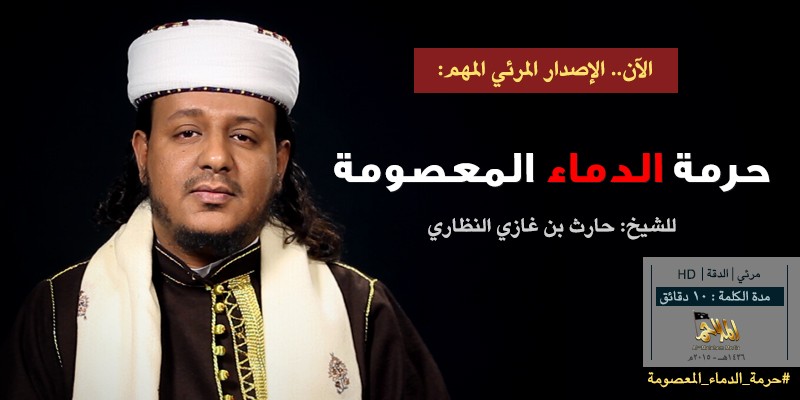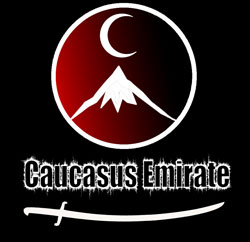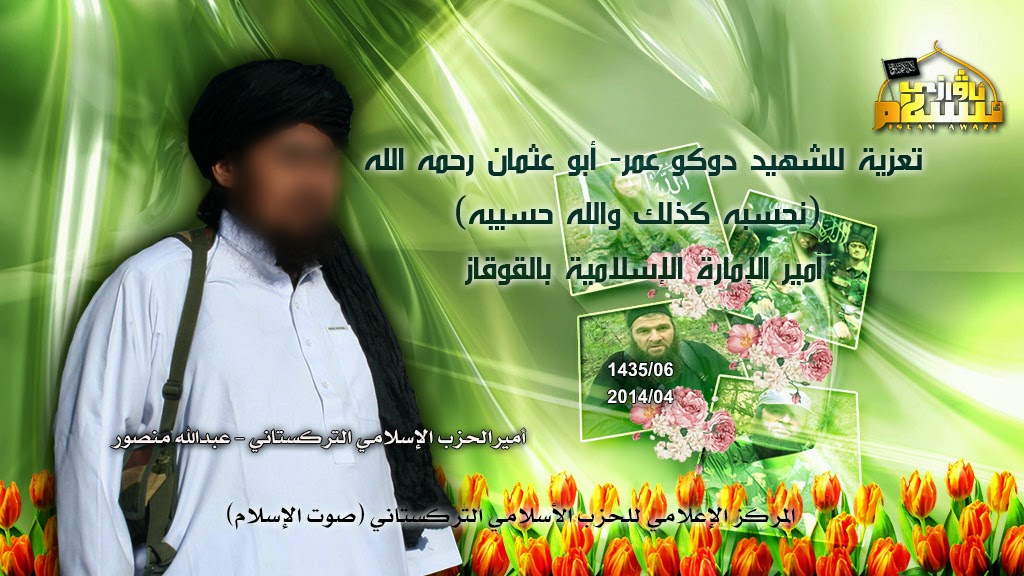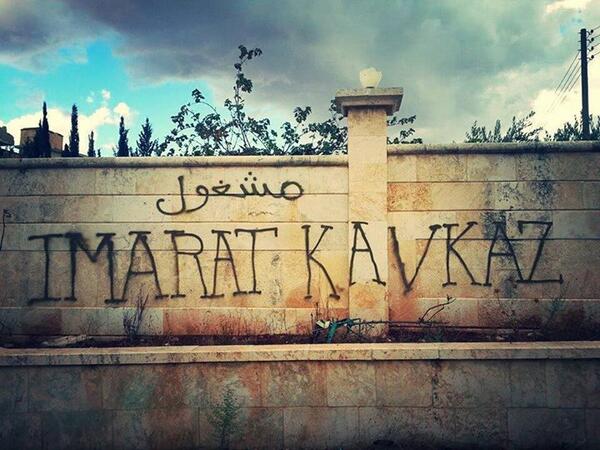
Click the following link for a safe PDF copy: Shaykh Khālid bin ‘Umar Bāṭarfī (Abū al-Miqdād al-Kanadī) — “Advice to the Mujāhidīn in General and the Mujāhidīn of the Caucasus and Arabian Peninsula in Particular”
____________
To inquire about a translation for this article for a fee email: [email protected]
Category: Russia
New statement from Wilāyah Dagestān of Imārat al-Qawqāz: "Seven Years Since the Announcement Of Imārat al-Qawqāz"

Click the following link for a safe PDF copy: Wilāyah Dagestān of Imārat al-Qawqāz — “Seven Years Since the Announcement Of Imārat al-Qawqāz”
___________
To inquire about a translation for this statement for a fee email: [email protected]
Kavkaz Center presents a new video message from Wilāyah Nokhchicho of Imārat al-Qawqāz: "Bay'ah To the Amīr Of Imārat al-Qawqāz 'Alī Abū Muḥammad al-Dagestanī"

___________
To inquire about a translation for this video message for a fee email: [email protected]
New video message from Wilāyah Dagestān of Imārat al-Qawqāz: "Eulogy For Dokku Umarov"

____________
To inquire about a translation for this video message for a fee email: [email protected]
New video message from Wilāyah Dagestān of Imārat al-Qawqāz: "Eulogy For the Comprehensive Martyrs Of the Fortress"

___________
To inquire about a translation for this video message for a fee email: [email protected]
Ṣawt al-Islām presents a new video message from Ḥizb al-Islāmī al-Turkistānī's [Turkistan Islamic Party] 'Abd Allah Manṣūr: "Eulogy For the Amīr Abū ‘Uthmān Dokku Umarov"

_________
To inquire about a translation for this video message for a fee email: [email protected]
The Clear Banner: "The Clash Over 'Real Jihad' in Syria: ISIS vs. the Caucasus Emirate"
NOTE: For prior parts in the Clear Banner series you can view an archive of it all here.
—
The Clash Over ‘Real Jihad’ in Syria: ISIS vs. the Caucasus Emirate

By Joanna Paraszczuk
The ongoing hostilities between the Islamic State of Iraq and a-Sham (ISIS) and Syrian brigades have exacerbated a pre-existing rift between rival North Caucasian factions in Syria, specifically Umar Shishani’s faction in ISIS and his former brigade Jaish al-Muhajireen wal-Ansar, which considers itself aligned to the Caucasus Emirate.
Essentially a struggle for prestige among North Caucasian jihadis in Syria and their supporters, the North Caucasian infighting has grown out of an ideological battle over which faction has the “correct” approach to jihad in general and the jihad “back home” in the North Caucasus in particular; how the jihad in Syria relates to the Caucasus Emirate’s struggle in the North Caucasus; and the circumstances under which North Caucasians may wage jihad in Syria instead of at home.
The ongoing debate has raised key questions not only about where North Caucasian jihadis’ loyalties should lie, but also about the nature of jihad in the North Caucasus and its relationship to jihad in other parts of the world. Is the North Caucasian struggle primarily a local, ethno-national battle restricted to “lands ruled by the Russian kuffar” (in which case North Caucasians ought to stay at home and fight there)? Or is it just one small part of a wider, transnational movement focussed on establishing a global Caliphate, a struggle that knows no national boundaries?
These difficult questions have been addressed by North Caucasians in Syria, by the Caucasus Emirate leadership itself and by pro-Caucasus Emirate outlets like Kavkaz Center. Moreover, against the background of the ongoing hostilities between the Islamic State of Iraq and as-Sham and Syrian brigades, this debate has become an integral element of a growing ideological rift between North Caucasians loyal to ISIS and those loyal to the Caucasus Emirate.
ORIGINS OF CHECHEN FIGHTERS IN SYRIA
The exact number of Chechen jihadis in Syria is unknown (and in any case numbers are fluid, as fighters are killed and new recruits enter Syria). Estimates have varied from around 200 to as many 1,700 fighters (the latter figure was given by the Russian Embassy in Damascus and is likely exaggerated).
Regardless of their numbers, these Chechen jihadis can be divided into four groups. The largest group are ethnic Chechens who had been living in Europe as migrants or refugees. The second-largest group is ethnic Chechens from Georgia’s Pankisi Gorge. Russian-language news site Kavkazskii Uzel estimates there are around 200 Pankisi Chechens in Syria, the most prominent of whom is ISIS military emir Umar Shishani. The third group are Chechens who came from Chechnya itself. Estimates of this group vary from 30-100 fighters and these include fighters from “Tarkhan’s jamaat”, the faction of Chechen commander Tarkhan Ismailovich Gaziyev, who split from Dokku Umarov in 2010. The smallest group consists of veterans of the Russo-Chechen wars, the most well-known of whom is Muslim Abu Walid Shishani who fought with Emir Khattab in Chechnya from 1995. Abu Musa Shishani, of whom little is known, is a seasoned fighter and is also likely a Chechen war veteran.
THE CAUCASUS EMIRATE’S POSITION ON THE SYRIAN JIHAD
The Caucasus Emirate (CE), officially declared on 31 October 2007 by a group of North Caucasian jihadis led by Dokku Umarov, has been described as a “transnational entity that extends beyond the Caucasus to encompass all Muslims oppressed by ‘Rusnya’” [i.e. Russia]. Umarov (whose death was announced on 18 March) expressed opposition to North Caucasian fighters traveling to Syria to wage jihad. In a November 2012 video address, Umarov accused those who had gone to Syria of undermining jihad at home, warning that these fighters were not waging jihad but simply trying to replace one taghut for another:
There are people going there [to Syria] who are saying that there is no jihad in the Caucasus, that jihad in the Caucasus is over, and therefore they allegedly went to Syria. No, there is jihad in the Caucasus, and it is more brutal and more severe than in Syria. No one provides help or support for jihad in the Caucasus.
However, by summer 2013, just before the first splits began to appear in the Chechen ranks, it seemed the CE was – at least in part – reevaluating this view, with CE-linked publications like Kavkaz Center beginning to report positively on Chechen fighters in Syria. As one analyst has argued, this move was likely, at least in part, an attempt to assert authority over Chechen jihadis in Syria, who appeared to be gaining in power and prestige.
While the Caucasus Emirate hardly expressed its full support for North Caucasians going to Syria to wage jihad, via its media outlets it moved toward the admission that this was permissible, if only for those who were not in a position to wage jihad back home. In other words, jihad in the North Caucasus should take priority over that in Syria, but the North Caucasian and Syrian jihads were part of the same global struggle of Islam against the kuffar.
Kavkaz Center hinted at this new position in July 2013 through a “letter to the editor” (purportedly) written by one Umm Sayfullah of Uruz Marten:
“The issue I want to discuss is jihad in Syria and the Caucasus. And even though several articles and fatwas have been published on this matter, the situation has not been clarified.
Jihad in Syria started after the jihad in the Caucasus, in Afghanistan, Iraq, Palestine, where the Holy Al-Quds has for several decades been occupied by the kuffar, but it’s the jihad in Syria that has become most popular among Russian-speaking followers of Islam, and even Caucasian Muslims, who are going to Syria in entire jamaats.
In connection with this, I want to raise the question — is it not a priority for Caucasian Muslims to wage jihad in the Caucasus? Allah is my witness, I’m not against brothers going to Sham. But isn’t fighting the kuffar in the Caucasus more important for Muslims from this area?
In Syria, as we know, Muslims are coming from all Arab countries, and also from Turkey, Pakistan, Southeast Asia, Europe, and America… So what about the Caucasus? It is right for Muslims to leave the fight at home and go to another area?
I understand that the jihad in Syria needs Mujahideen. We see how the kuffar, Shi’ites from all over the globe are joining in the war against Sham and this is a serious issue. But for Caucasians, in my view, the priority has to be jihad in their native home. After all, the hardest jihad is in the Caucasus today! …
I think that Emirs in the Caucasus and in Syria need to explain to people, that those Caucasian brothers who can join the jihad in the Caucasus must in the first instance try to go there. And in the event that there is no way for them to get there or if there is some major reason — then they can go elsewhere.
Those brothers from Syria, who ask for help, must absolutely explain that they are talking about those who cannot wage jihad for the Caucasus Emirate. And that for Caucasians, jihad at home is more important and the first priority over jihad in any other place.”
Two weeks later, on July 30, 2013, this message was further reinforced in a a video address — also published on Kavkaz Center — by a Chechen fighter named Salahuddin Shishani, at the time the commander of a group named az-Zubеyr. Salahuddin, who had been named the “official representative of the Caucasus Emirate in Syria” was therefore presumably also speaking in that faction’s name when he addressed “the Muslims of the Caucasus, Crimea, and other Muslim lands occupied by the Russian kuffar”. In other words, this is not an address intended for Muslims or Mujahideen in general, but for those under the ideological sway of the Caucasus Emirate.
In the video, Salahuddin – whose affiliation to the Caucasus Emirate further emphasized by his sartorial choice of an “Imarat Kavkaz” logoed t-shirt – repeats the message given in Umm Sayfulla’s letter, but goes beyond this by placing the issue of where North Caucasians should wage jihad in the context of a more global cause. It is understandable, he notes, that Muslims from countries where there is no jihad or where it is not possible to wage jihad should come to Syria. However, he cautions, such a move is “not correct” for those in places where there is already jihad, such as Libya, Kashmir “or our Caucasus”. Notably, Salahuddin also refers clearly to Dokku Umarov’s authority by noting that the CE leader gave an explicit order for North Caucasians to wage jihad against the Sochi Olympics, an order which must take priority to the jihad in Syria, at least for those able to fulfill it.
SPLITS IN THE RANKS
Infighting among North Caucasian fighters in Syria began as early as August 2013. By summer 2013, many if not most Chechen fighters were part of the Jaish al-Muhajireen wal-Ansar brigade (JMA), commanded by a charismatic, ginger-bearded jihadi named Umar Shishani.
By August, however, there were already signs of tensions among North Caucasian jihadis.
One cause of the tensions was the decision by Umar Shishani to take on the role of ISIS military emir in northern Syria. Although at that stage he had not formally sworn allegiance to ISIS nor did he move for JMA to be absorbed into join ISIS, the predominantly North Caucasian faction was de facto fighting as part of ISIS, most notably in the battle for Menagh Airbase in Aleppo.
In August, Umar very publicly expelled a group of about 27 Chechens headed by Sayfullah Shishani, a charismatic and volatile ethnic Chechen who was formerly Umar’s
New video message from Wilāyah Dagestān of Imārat al-Qawqāz: "New Words From the Mujāhidīn in Dagestān and Its Amīr Abū Muḥammad"

_________
To inquire about a translation for this video message for a fee email: [email protected]
New video message from Wilāyah Dagestān of Imārat al-Qawqāz's Abū Muḥammad: "About the Appointment of the Deputy Amīr of Imārat al-Qawqāz"

__________
To inquire about a translation for this video message for a fee email: [email protected]
New audio message from Imārat al-Qawqāz's Abū Muḥammad 'Alī al-Qawqāzī: "Reasons for the Humiliation of This Ummah"
___________
To inquire about a translation for this video message for a fee email: [email protected]
